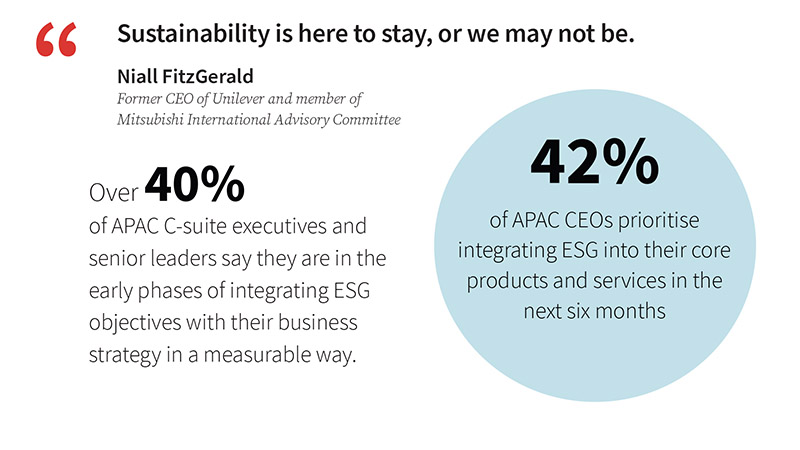Boardroom brief that matters: Sustainability
Making a positive environmental impact can help businesses drive long-term financial performance
Take the sustainability brief on-the-go,
What's the issue?
Sustainability is now a priority across most corporate agendas. Most business leaders believe it’s important, and for good reason: there’s strong correlation between a company’s resource efficiency and strong financial performance.
The net effect of “being green” has a direct correlation to the bottom line too. Analysis by EY recently showed “sustainable” companies outperformed their industry peers across gross profit, earnings before interest, taxes, depreciation, and amortisation (EBITDA), earnings before interest and taxes (EBIT), and net profit metrics by a significant margin of 3.1 to 6.3 percentage points. However, it’s not cheap or easy to implement on any scale... Shifting the planet away from greenhouse emitting fuels will cost US$2 trillion a year by 2030, according to estimates from the International Energy Agency.
In Asia Pacific, 75% of employees demand sustainable business practices; and 90% of consumers support environmentally friendly brands (Bain). Hiring for green jobs has already seen a 30% growth in APAC since 2016, although it still trails behind the U.S. (70%) and Europe (41%) (LinkedIn Green Skills Report). Limited resources often hinder companies in achieving their sustainability goals, running the risk of “greenwashing” that may erode trust and invite regulatory scrutiny and penalties.
Boardroom whispers...
Good for business. At the highest level, there is broad consensus across all sectors that sustainable initiatives are good for business. Reducing operational costs and attracting talent are still key drivers in operational strategies, alongside a range of grants, loans, and schemes designed to help enterprises transition to a low-carbon future. Investment options like green bonds and sustainable equity funds continue to grow in popularity into 2024.
Green dragons. Despite signs of economic slowdown, many businesses are still looking to China’s efforts to combat air pollution, as it is anticipated to generate investment opportunities worth more than US$3 trillion through 2030.
Three ways real estate is helping boardrooms with the bottom line
Green building practices
Collaboration between landlords and tenants is leading to better practices in construction, design, retrofitting, green lease partnerships, optimising energy consumption, minimising carbon footprint, and cost savings on energy bills to align with company commitments to science-based ESG goals
Tech-driven infrastructure
Technology advancements help data monitoring, optimised energy usage, and automated energy-saving measures, resulting in better efficiency and reduces environmental impact. Integrating renewable energy sources with advanced energy storage systems further reduce carbon emissions
Sustainable financing
Moving boardrooms towards eco-responsible investments and securing funds for energy-efficient building upgrades and renewable energy projects. ESG-related incentives enable businesses to integrate sustainable criteria into their borrowing decisions to gain an advantage
Connect with our experts
When it comes to tackling boardroom issues, we're here to connect you with the right specialist.
PRIVACY NOTICE
Jones Lang LaSalle (JLL), together with its subsidiaries and affiliates, is a leading global provider of real estate and investment management services. We take our responsibility to protect the personal information provided to us seriously.
Generally the personal information we collect from you are for the purposes of dealing with your inquiry.
We endeavor to keep your personal information secure with appropriate level of security and keep for as long as we need it for legitimate business or legal reasons. We will then delete it safely and securely. For more information about how JLL processes your personal data, please view our privacy statement.

